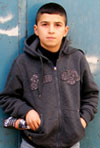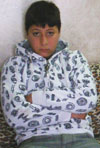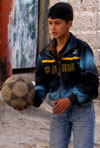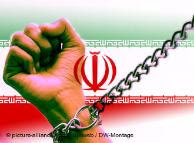established in 1989
17 Feb. '10: Israel Police arrests children aged 12 to 15 in night raids in Silwan, East Jerusalem
In recent months there have been many cases in which minors aged 12-15 from Silwan, in East Jerusalem, were arrested in the middle of the night by police officers and Israel Security Agency agents accompanied by armed border policemen. The minors were taken out of their beds and brought to the police station in the Russian Compound, in West Jerusalem. Some of them were brought handcuffed, and none of the parents were allowed to accompany them. At the station, the minors were interrogated on suspicion of stone throwing. According to testimonies that some of them gave to B'Tselem, the interrogators beat and threatened them.
The series of arrests was apparently carried out in light of the ongoing friction between residents of Silwan and the settlers in nearby Beit Yehonatan and security personnel guarding it, in which context Palestinian children in the neighborhood throw stones at the building.
In his testimony to B'Tselem, Muhammad Dweik, 12, described his arrest in the middle of the night:
 "Around 4:30-5:00 in the morning, I woke up from the sound of knocking at the door. Shabak [ISA] agents asked my father for the ID card of Muhammad Dweik. My father told them that I don’t have an ID card. When I went over to them, I got the feeling they were surprised by how young I am, but they had an arrest warrant. My father asked them to let me stay at home and said he would bring me to the police station in the morning, but they refused. They tied my hands behind me and took me. The policemen put me into a Border Police jeep. A friend of mine was also inside it. A policeman who sat next to me kept kicking me in the leg all the way."
"Around 4:30-5:00 in the morning, I woke up from the sound of knocking at the door. Shabak [ISA] agents asked my father for the ID card of Muhammad Dweik. My father told them that I don’t have an ID card. When I went over to them, I got the feeling they were surprised by how young I am, but they had an arrest warrant. My father asked them to let me stay at home and said he would bring me to the police station in the morning, but they refused. They tied my hands behind me and took me. The policemen put me into a Border Police jeep. A friend of mine was also inside it. A policeman who sat next to me kept kicking me in the leg all the way."
Lu’ai a-Rajabi, 14, told B'Tselem about his arrest and interrogation on 10 January 2010:
 "During the interrogation, when I denied that I had thrown stones at the settlers’ house, the interrogator punched me in the nose. I was sitting on a chair, my hands and legs cuffed, my nose bleeding, and the interrogator was standing in front of me. He drew a bicycle on the board hanging on the wall and told me to get on it. I said, “How can I do that?” He said, “Everyone knows how to ride a bike!” When I refused to do it, he hit me on my head and face with his hands. I remember that, at some point, two men came into the room and said to me, “Don’t you want to confess?” I said, “Confess to what?” Then, while I was sitting on the chair with my hands cuffed, the three interrogators began to beat and kick me all over my body, and to swear at me and Allah. [...]
"During the interrogation, when I denied that I had thrown stones at the settlers’ house, the interrogator punched me in the nose. I was sitting on a chair, my hands and legs cuffed, my nose bleeding, and the interrogator was standing in front of me. He drew a bicycle on the board hanging on the wall and told me to get on it. I said, “How can I do that?” He said, “Everyone knows how to ride a bike!” When I refused to do it, he hit me on my head and face with his hands. I remember that, at some point, two men came into the room and said to me, “Don’t you want to confess?” I said, “Confess to what?” Then, while I was sitting on the chair with my hands cuffed, the three interrogators began to beat and kick me all over my body, and to swear at me and Allah. [...]
I asked to go to the bathroom and to get some food, but the interrogator refused. He told me to sign a paper written in Hebrew that says nobody beat me. I refused to sign. Then he began to slap me in the face."
The next day, a-Rajabi was brought before a Magistrates Court judge, who extended his detention to an entire week.
Ahmad Siyam, 12, was also arrested on 10 January. In his testimony, he related how he waited for the interrogation to begin at the Russian Compound.
"We got to the Russian Compound. They put me in a room and told me to sit on my knees facing the wall. Whenever I moved, a bald guy in civilian clothes hit me on the back of the neck with the palm of his hand. We were the only ones in the room. Around 5:00 in the morning, I asked to go to the bathroom, but he didn't let me and told me to turn my head back to face the wall. I refused, and he pushed me to the wall. My nose hit the wall and began to bleed. I asked for paper to clean my nose, but he didn't want to give me any. Then he told me to bow down to him on the floor and ask for him to forgive me, but I refused to do it. I told him I don’t bow to anyone but Allah. While this was going on, my legs began to hurt a lot. I was really frightened and started to shake. After that, the bald guy made himself a toasted cheese sandwich. He threw a piece of cheese at me, but missed. From time to time, he pressed my shoulders, which really hurt."
Mahmoud Gheith, 14, was arrested under similar circumstances in November 2009. He told B'Tselem that he was released from detention with a restraining order requiring him to stay away from his house for one month.
 "Since the arrest, I haven’t been able to sleep properly. I keep being afraid that they’ll arrest me again.
"Since the arrest, I haven’t been able to sleep properly. I keep being afraid that they’ll arrest me again.
After they released me, I was under house arrest at my uncle’s house in Beit Hanina. They ordered me to stay away from home for a whole month. On the ‘Eid al-Adha festival, they let me go home to Silwan for four days. My uncle had to drive me to school in Silwan. On days when he couldn’t take me, I didn’t go to school."
The authorities’ treatment of these minors completely contravenes the Youth Law, as amended in 2008 (Amendment No. 14). Under the Law, a minor who is suspected of committing a criminal offense is entitled to consult with a parent or another relative prior to being interrogated, and to have the parent or relative present at the interrogation. The Law also generally prohibits interrogating a minor at night and states that a minor should not be arrested if the objective can be achieved in a less harmful way. In the present case, some of the parents were willing to undertake to bring the minors in for interrogation in the morning, and there was no need for the night arrests.
These actions by the authorities severely violated the human rights of the minors, all of whom are Israeli residents. There is no logic to conducting a military-style arrest operation in the middle of the night, with the aim of interrogating children suspected of throwing stones, and this course of action cannot be justified on any grounds. It is hard to believe that the security forces would have acted similarly against Jewish minors.
B'Tselem sent urgent letters to the Jerusalem District Police Commander, Maj. Gen. Aharon Franco, and to the head of the Department of the Investigation of Police, Herzl Shviro, demanding that police, ISA, and Border Police operations to detain minors in Silwan cease. If any child from the neighborhood is suspected of having committed a criminal offense, he can be summoned for questioning in the presence of an adult on his behalf. Also, the questioning must be conducted by youth interrogators.







هیچ نظری موجود نیست:
ارسال یک نظر